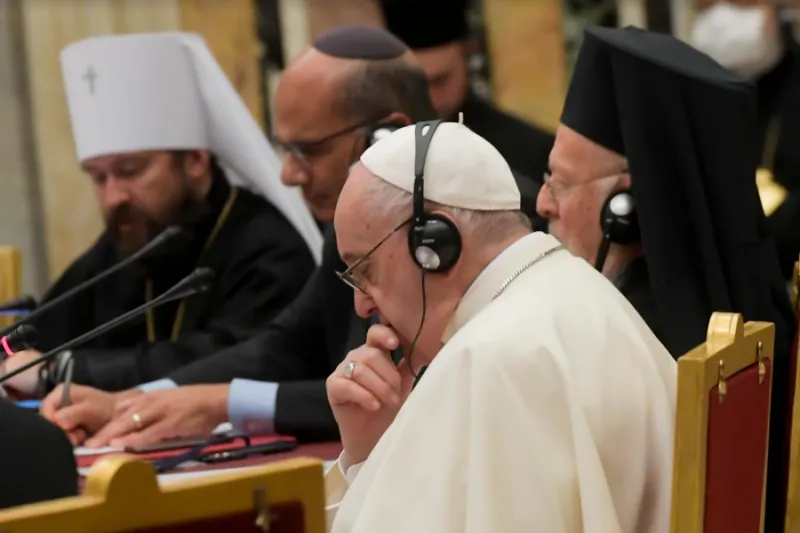
Vatican City, Oct 5, 2021 / 12:00 pm (CNA).
Religious leaders from different faiths met at the Vatican on Tuesday to discuss education on World Teachers’ Day.
The interreligious meeting on Oct. 5 included Orthodox, Muslim, Jewish, Buddhist, Sikh, Jain, Calvinist, Quaker, and evangelical representatives who gathered together with Pope Francis.
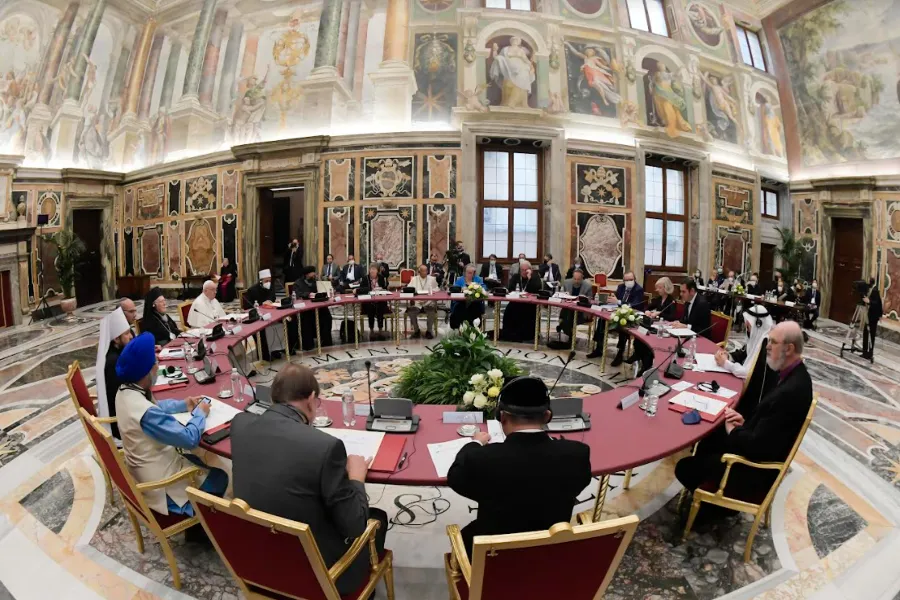
The group released a joint statement following the meeting urging teachers to commit to “researching new ways of understanding the economy and politics, as instruments at the service of people and the entire human family, and with a view to a holistic ecology, by teaching lifestyles that are more respectful of the environment.”
The meeting was part of the Global Compact on Education launched by Pope Francis in October 2020.
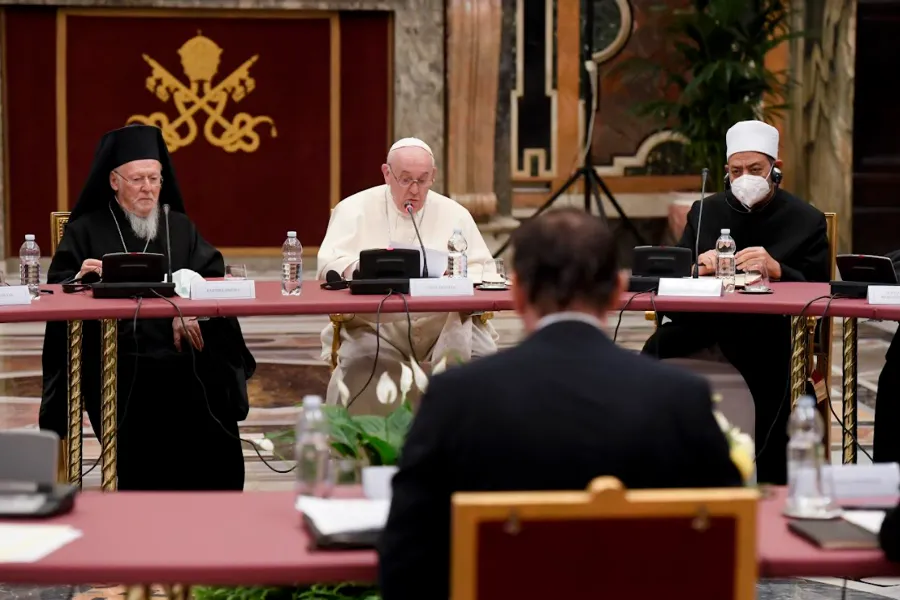
The religious representatives also called for forms of education that put “the human person at the center of every educational process” and respect “women’s dignity so as to build with them a future of justice and peace.”
Ecumenical Patriarch Bartholomew I of Constantinople and Ahmed al-Tayyeb, the grand imam of al-Azhar in Cairo, Egypt, were among the participants, along with Ayatollah Seyed Mostafa Mohaghegh Damad from Tehran, Iran, and a representative of Venerable Master Hsin-Tao, the founding abbot of Ling Jiou Mountain Buddhist Society.
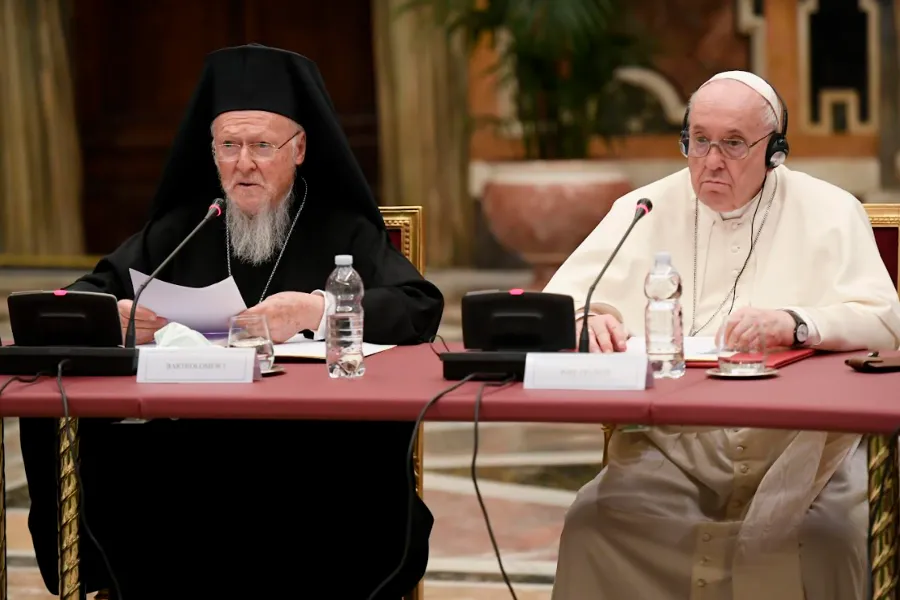
Pope Francis addressed the religious leaders in the Clementine Hall of the Apostolic Palace.
“Religions have always had a close relationship with education, accompanying religious activities with educational, scholastic and academic ones. As in the past, so also in our day, with the wisdom and humanity of our religious traditions, we want to be a stimulus for a renewed educational activity that can advance universal fraternity in our world,” the pope said.
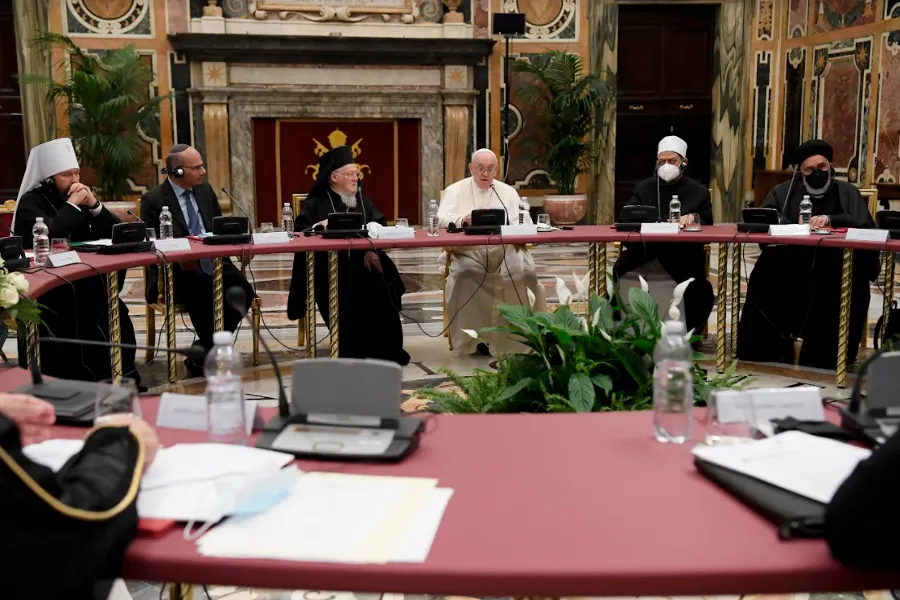
“If in the past, our differences set us at odds, nowadays we see in them the richness of different ways of coming to God and of educating young people for peaceful coexistence in mutual respect.”
UNESCO established Oct. 5 as World Teachers’ Day in 1994.
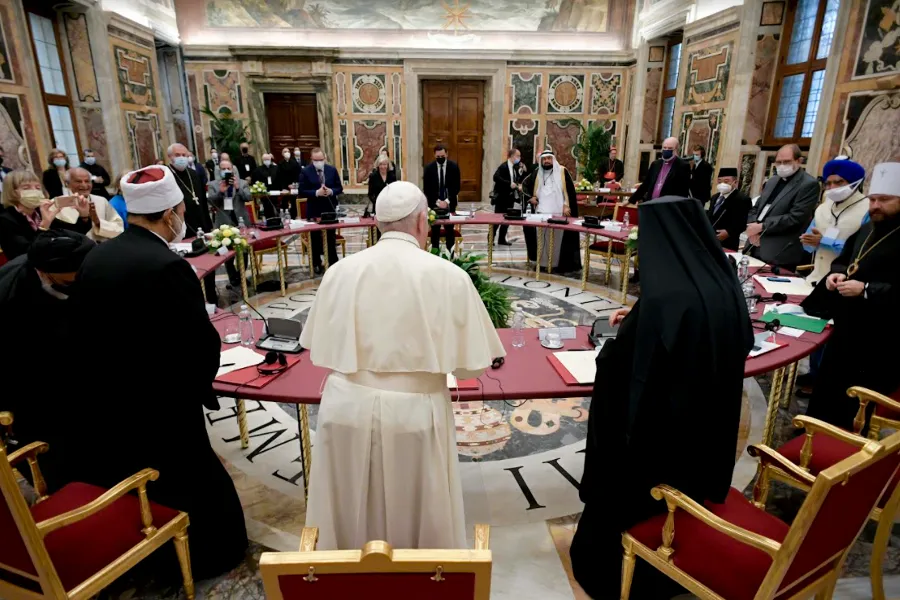
The pope said that the key to a more fraternal world was the education of young people to appreciate one another “regardless of where he or she was born or lives.”
“If in the past, the rights of women, children and the most vulnerable were not always respected, today we are committed firmly to defend those rights and to teach young people to be a voice for the voiceless,” he said.
Pope Francis also stressed the need for educators to train future generations in “more sober and ecologically sustainable lifestyle.”
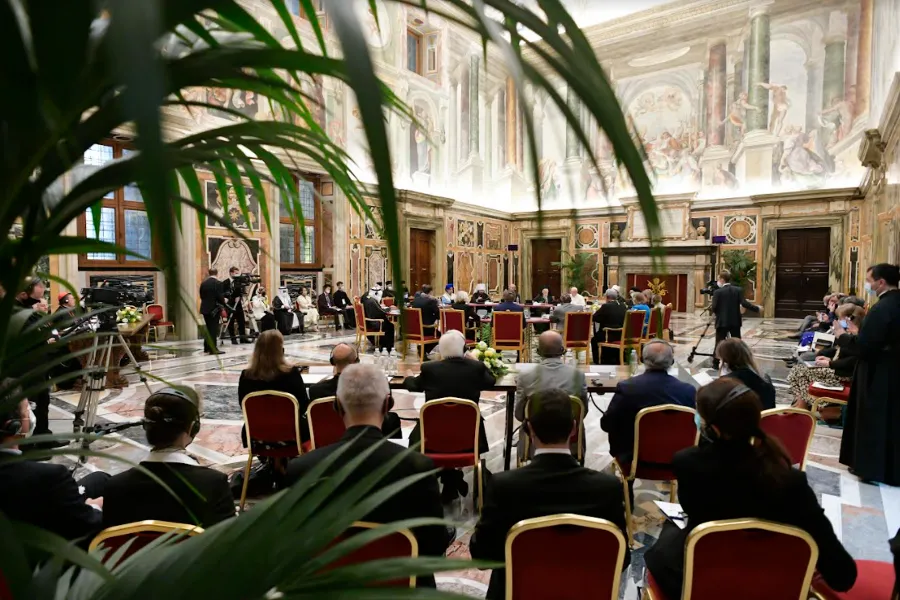
“Education commits us to love our mother Earth, to avoid the waste of food and resources, and to share more generously the goods that God has given us for the life of everyone. I think of what one thinker, not a Catholic, used to say: ‘God always forgives, we occasionally forgive. Nature never forgives,’” he said.
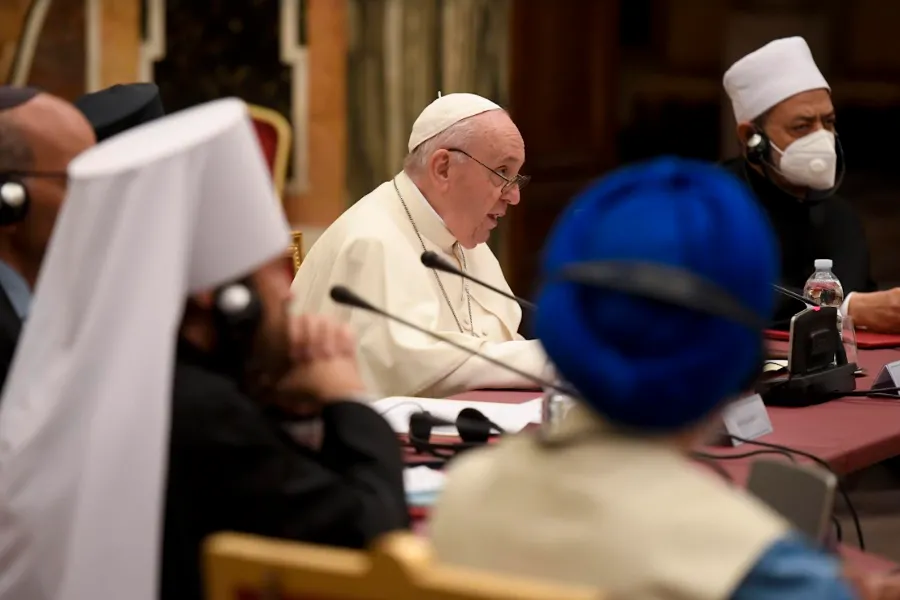
At the end of his speech, the pope asked each religious leader to spend a “brief moment of silence, asking God to enlighten our minds so that our dialogue will bear fruit and help us courageously to pursue the paths of new educational horizons.”
If you value the news and views Catholic World Report provides, please consider donating to support our efforts. Your contribution will help us continue to make CWR available to all readers worldwide for free, without a subscription. Thank you for your generosity!
Click here for more information on donating to CWR. Click here to sign up for our newsletter.




With much the same message, and more lucidly than some, Pope John Paul II linked the ecological challenge with human life:
“As I have already stated, the seriousness of the ecological issue lays bare the depth of man’s MORAL CRISIS. If an appreciation of the value of the human person and of human life is lacking, we will also lose interest in others and in the earth itself [….] the human person, endowed with the capability of choosing freely, has a grave responsibility to preserve this order for the well-being of future generations. I wish to repeat that the ecological crisis is a moral issue” (“Message for the 1990 World Day of Peace,” December 8, 1990; last sentence in italics).
The ADDED CHALLENGE for the perennial Catholic Church is to proclaim the moral issue without submerging it back into a range of closely related, preemptive political options and agendas sometimes embedded in “educational” institutions—and capable of debate!
The Catholic Social Teaching on solidarity, especially, is the “negation of ideology,” belonging instead “to the field…of theology and particularly moral theology” (Centesimus Annus, 19993, n. 55, citing Pope Paul VI’s Homily at the final public session of the Second Vatican Council, AAS 58, 1966).
Concluding his Message of 1990, Pope John Paul II introduces an interesting word:
“It is my hope that the inspiration of St. Francis will help us to keep ever alive a sense of ‘FRATERNITY’ with all those good and beautiful things which almighty God has created. And [he adds] may he remind us of our serious obligation to respect and watch over them with care, in light of that greater and higher fraternity that exists within the human family” (all caps added).
A setting in which traditionalist perspectives on interfaith unity and cooperation has appeal. From my previous comment, “Wynand De Beers’ holistic philosophy is attractive as an appeal to unity and the spiritual. It certainly is a first things first approach identifying what we all have in common, the inherent grasp of universal truths”. Should we add to this discussion what was missing then and is missing now in an historical parallel? “The Catholic Herald Heretic of the week. Charbonneau-Lassay [and Jacques Maritain] saw traces in other world religions of the original Revelation from whence Judaism and then Catholicism had sprung; but for him these were to be used to draw people to the One True Faith. For Guénon [with Frithjof Schuon a traditionalist founder], however, Catholicism fell short of being a genuine conduit – which led not only to a break with his Catholic friends (Maritain tried to have his work put on the Index of Forbidden Books), but to his own conversion to Islam”. At this decisive moment in our history when the trend is toward a globalist vision in which the salt of Catholicism now becoming one among many loses its savor, must we witness to Christ beyond what John Paul II deemed adequate? What Saint Francis envisioned during Christendom differs radically in context to what John Paul envisioned 1990 during the collapse of the Soviet Union. As it does presently with the inexorable advent of Globalism replacing the Advent of Christ. Fratelli Tutti is more in line with a paved over Christianity suitable to its incorporation into a world body. An ode to Mother Earth offered by Pope Francis at the interreligious meeting on education speaks to this dilemma of misplaced priorities, “God always forgives, we occasionally forgive. Nature never forgives”. Prayerful, however so nevertheless to the wrong god. Christ proclaimed in season and out is not just the better, now the only approach. Proclamation of the Cross he bore as did Saint Francis bearing the wounds of Christ reconfigures ecology incontext of what most matters. Man’s salvation.
All so very true–the Ode to Mother Earth (e.g., Pachamama). Instead, and regarding the task of real inculturation we have this:
“The process of inculturation may be defined as the Church’s efforts to make the message of Christ penetrate a given sociocultural milieu, calling on the latter to grow according to all its particular values, as long as these are compatible with the Gospel. The term inculturation includes the notion of growth, of the mutual enrichment of persons and groups, rendered possible by the encounter of the Gospel with a social milieu. ‘Inculturation is the incarnation of the Gospel in native culture and also the introduction of these cultures into the life of the Church'” (International Theological Commission, “Faith and Inculturation,” The Holy See, 1988).
Too often Pope Francis and his handlers replace the “message” with what he calls “making a ‘mess’ of things.”
A very credible Chinese convert to Catholicism (John C. W. Wu, who translated the Bible into Chinese in the 1920s) remarks that while the Eastern (natural) religions are not the same as the Logos, they do at least, and significantly, “point to the Logos” (University of Notre Dame doctoral dissertation by John A. Lindblom, 2021). Somewhat as did Classical thought in the West. The Incarnation is a fulfillment of the search which is built into human nature, East and West.
For particular reasons, and as an non-credentialed non-specialist, I would have trouble including the religion of Islam in this category, although “witnesses” to Christ (faith in the person of Christ) can still have ennobling discussions with the “followers” of Islam (distinguished from the overlaid belief system or natural/encysted religion called Islam). Scratching the surface on this fascinating topic, I humbly propose an author interview conducted with me by CWR in 2017: https://www.catholicworldreport.com/2017/04/29/the-mosque-the-manger-and-modernity/